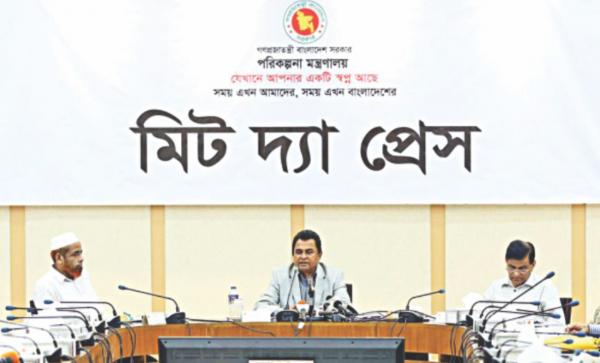GDP growth in FY18 to be near 8pc: minister

The country's economic growth could hit a record high of about 8 percent in the last fiscal year in the final count, Planning Minister AHM Mustafa Kamal said yesterday.
“Prime Minister Sheikh Hasina will announce the actual figure soon,” he told reporters at the auditorium of the National Economic Council.
As per the preliminary estimate, the gross domestic product growth was 7.65 percent in 2017-18, but in the final count it will be much higher, Kamal said.
He said he knew about the final GDP figure, but declined to disclose it. It will be something near 8 percent, he said.
In the current fiscal year, the growth will be 8.25 percent, he said. The government has targeted to achieve 7.8 percent economic growth in 2018-19.
The planning minister said there will be no problem in implementing the annual development programme (ADP) in the current fiscal year.
Kamal said he had met with the secretaries of all ministries and issued a directive so that the ADP implementation is not hampered by the election, due in December.
The government has put in place a new rule that exempts files from coming to the finance minister or the planning minister for release of project funds in the first and second quarters of the fiscal year, he said.
“Funds will automatically be deposited to the accounts of the projects. So, the implementation of the ADP will not be hampered.” During the briefing, Kamal also released the inflation data.
Inflation fell slightly to 5.48 percent in August thanks to a fall in food prices. It was 5.51 percent in July.
Kamal said inflation did not increase as an adequate amount of imported goods was in stock. On the other hand, the government was active during the Eid period and the prices of essential items did not go up consequently.
In August, food inflation fell 21 basis points to 5.48 percent. In July, it rose 20 basis points to 6.18 percent.
Non-food inflation went up by 24 basis points to 4.73 percent last month. In July, it declined 62 basis points to 4.49 percent.
Zahid Hussain, lead economist of the World Bank's Dhaka office, said, “The good news is the headline inflation has continued to fall driven entirely by the decline in food inflation.” He said it appears that the drop in rice prices played a major role.
In August, the average price of coarse rice in Dhaka was 0.2 percent lower than in July this year and 3.2 percent lower than in August 2017.
Hussain said, “The bad news is there is further increase in non-food inflation, which has been rising since reaching its low of 3.2 percent last January.”
“It has now surpassed 4.7 percent perhaps because of a sustained high domestic demand, resulting from increased remittances and private credit growth, as well as exchange rate depreciation and seasonal factors such as Eid in August.”
The economist said demand pressures are likely to deepen in the run up to elections.
“Continued vigilance on the part of the Bangladesh Bank particularly in maintaining prudential control over domestic credit growth will be very important in the days ahead.”
